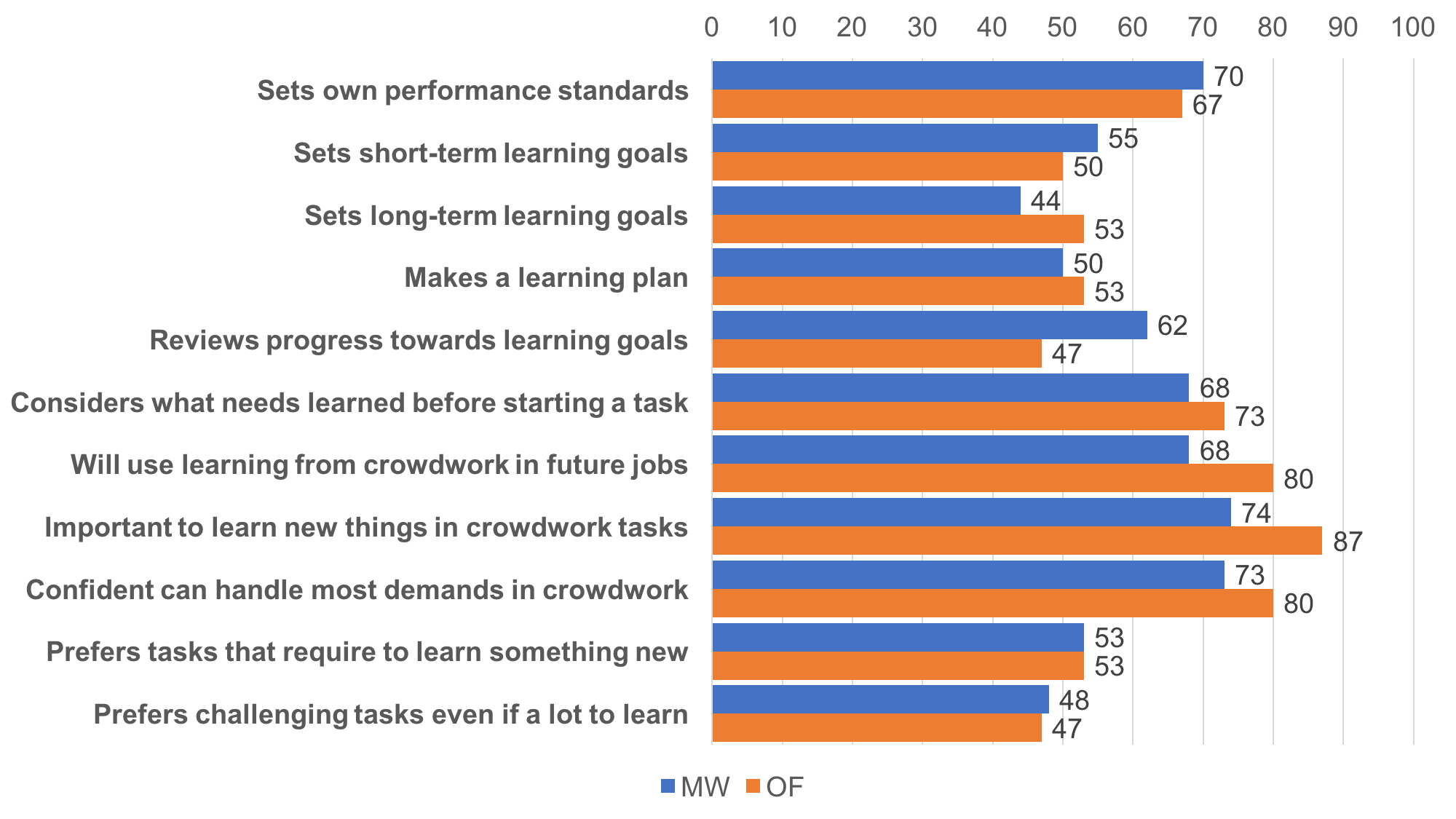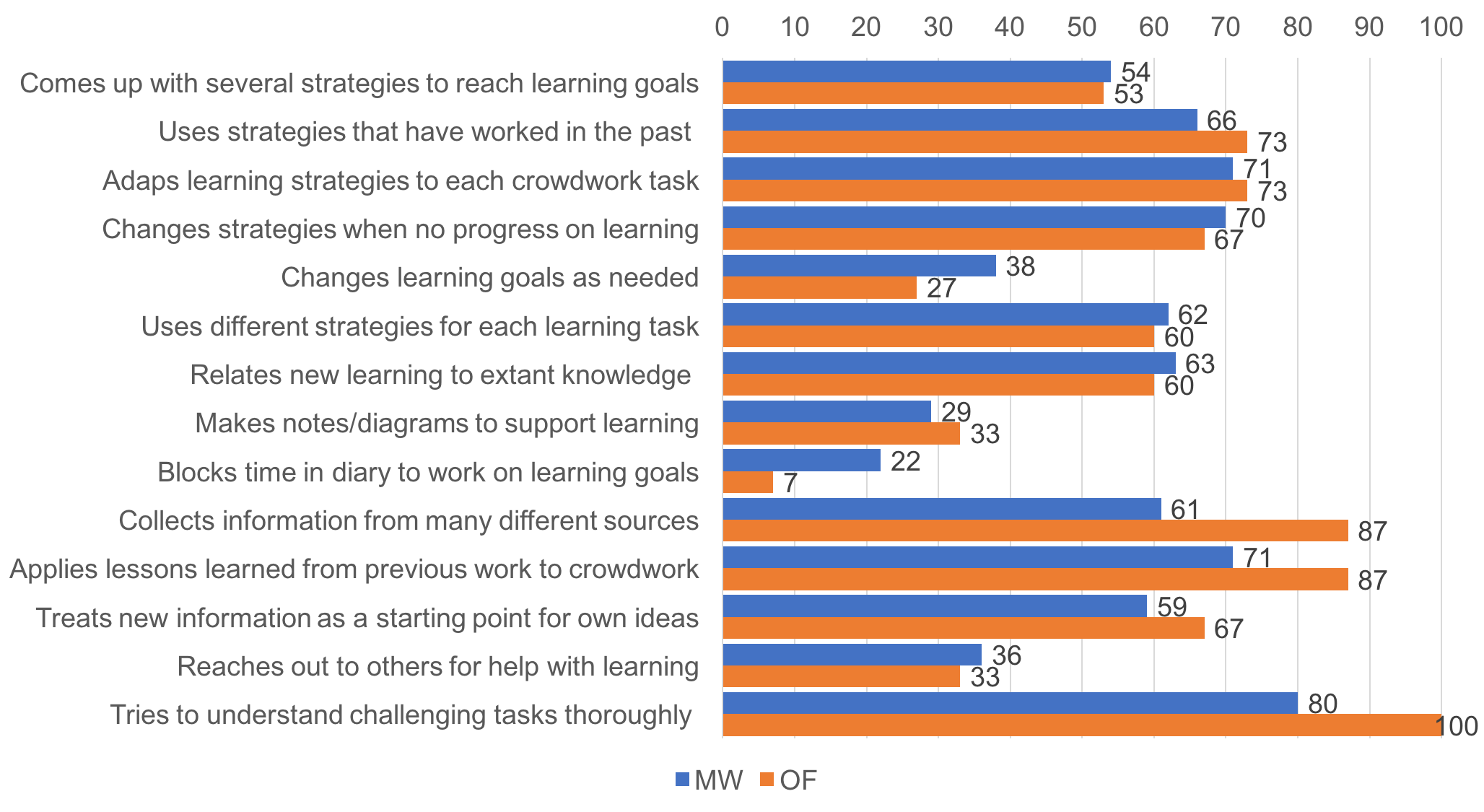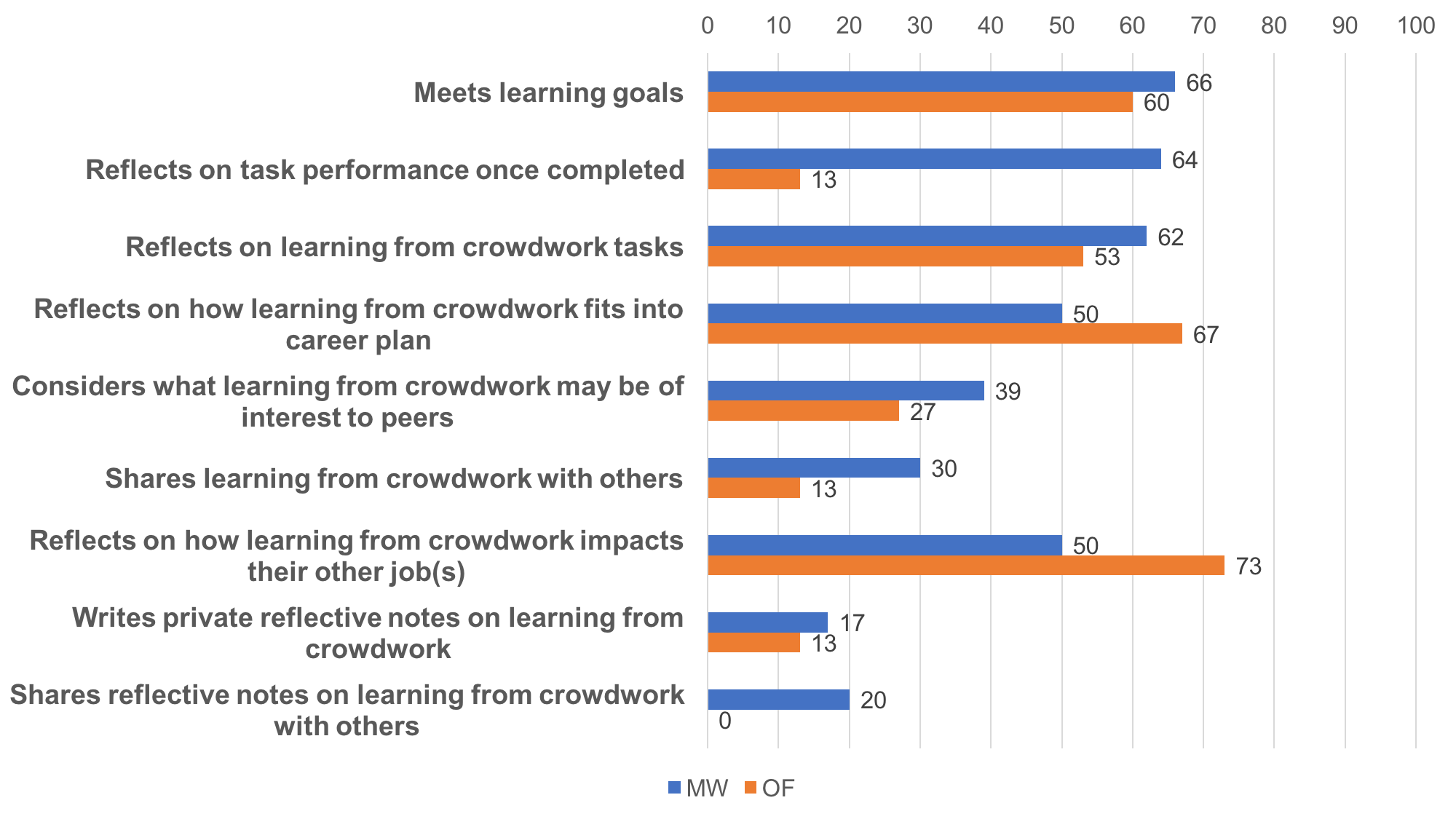| Job title | Postdoctoral Researcher |
| Institution | Copenhagen Business School |
| Department | Digitalization (DIGI) |
| Division | Learning in the Platform Economy (LeaP) Research Programme |
| Location | Howitzvej 60, Frederiksberg 2000, Copenhagen, Denmark |
| Salary | DKK 36.269 – 43.027 per month depending on experience |
| Hours & Contract type | Full time (37 hours per week), fixed term for 2 years |
| Closing date | 9 January 2022 |
The roles
We are seeking two outstanding Postdoctoral Researchers to work with Professor Anoush Margaryan at Copenhagen Business School’s Department of Digitalization on a research programme investigating workplace learning and skill development practices in emergent forms of online and AI-mediated work.
The research programme is titled ‘Learning practices in the platform economy’ (LeaP). It has been funded by the Volkswagen Foundation, Alexander von Humboldt Foundation, Candys Foundation, the European Centre for the Development of Vocational Education (Cedefop) and is led by Professor Margaryan.
LeaP is an interdisciplinary research programme focused on advancing the theory, methodology and policy of learning practices and learning processes in the platform economy. LeaP pursues a dual aim of (i) advancing the understanding of fundamental processes and practices of workplace learning and skill development within new and emergent forms of work in platform and AI-mediated settings; and (ii) developing applications, toolkits and design guidelines to inform and guide policy and practice of workplace learning in the digital economy. LeaP seeks to develop impactful research outcomes that contribute tangible theoretical and methodological advances as well as helping organisations, policymakers and other societal stakeholders nationally and internationally to design workplace and work-related learning environments that can empower individuals to take control of their own learning and development, fostering economic performance, capabilities, skills and well-being in our societies.
LeaP leads research around three interrelated themes: (i) workplace learning practices and processes in new and emergent forms of online platform work; (ii) skill formation and learning in AI-mediated work settings; and (iii) aligning higher education and emergent work practices in the digital economy.
Postdoctoral Researcher 1 will broadly focus on the analysis of workplace learning and skill development practices and processes in online labour platforms (LeaP theme 1) while the second post will examine the nature, practices and processes of skill formation and development in AI-mediated workplaces (LeaP theme 2). Whilst each post will focus on their own theme, both posts will be expected to contribute to LeaP theme 3, by developing ideas on how the outputs from their research could inform teaching practices in education to ensure that students are well-prepared for the future of work.
The Postdoctoral Researchers will be expected to work with Professor Margaryan on ongoing projects within the LeaP programme, whilst developing their own independent research profile within the remit of the LeaP research programme. They will be expected to publish research of international excellence in peer-reviewed journals (such as those included in FT50 and AJG 3-4* ranking lists and discipline-specific high impact journals). The Postdoctoral Researchers will be expected to fully engage and participate in the academic life of the research group and the University.
Both positions are 100% research-focused and do not include teaching duties.
Candidate profile
The successful candidates will hold a PhD (or be very near defending/submitting their PhD) specialising in adult professional learning, workplace learning, education/training, sociology of education, work/educational psychology, human resource development or other related fields that study learning processes and/or learning practices of adults in work settings. It is essential that the candidates have prior experience of research on workplace/adult learning and skill development in the workplace, preferably in digitally-mediated, knowledge-intensive domains. Candidates should demonstrate interest in grounding their research in fundamental learning sciences theory, in particular theories of adult learning and development, technology-enhanced professional learning, workplace learning and self-regulated learning. Experience of research on learning practices in online labour platforms and AI-mediated work settings would be a plus. The successful candidates will demonstrate proven ability to write articles in English suitable for publication in high-impact journals. They will have advanced skills in analysing quantitative data (in R or Stata), solid experience of analysing qualitative data (with Nvivo or similar) and proven experience of collecting quantitative and qualitative data. They will be self-regulated and organised, proactive, attentive to detail, and possess effective interpersonal skills.
Main responsibilities
- Collecting and analysing quantitative and qualitative data, including analysing existing survey and questionnaire datasets recently collected within the LeaP research programme
- Undertaking literature search and reviews and other desk research
- Contributing to and leading journal publications co-authored with other members of LeaP
- Contributing to and leading other types of research dissemination activities such as conference presentations, blogs and project reports
- Engaging with and regularly presenting the progress of their research within internal seminars
- Developing ideas for follow-up research grants and collaborating with Professor Margaryan and other members of the group on grant writing
- Contributing to research programme administration; assisting in grant reporting; maintaining LeaP website and blog; and supporting other members of the group as required
- Helping to develop work plans and monitor progress highlighting issues and risks in a timely manner
- Facilitating day-to-day communication and collaboration between the members of the research programme and the internal and external collaborators
- Representing LeaP at internal and external meetings, seminar and events and presenting papers and talks at conferences, public events and internal and external stakeholder meetings
- Managing own research and administrative activities in line with agreed deliverables and timeline
Selection criteria
Essential criteria
- A completed PhD (or near completion) in one of the following disciplines/fields: learning sciences, adult and workplace learning, technology-enhanced learning (with grounding in social sciences research), education/training, sociology of education, work/educational psychology, human resource development, or related fields with specialisation in learning processes and/or learning practices of adults in work settings
- Proven ability to write academic articles in English publishable in highly impact-rated journals
- Evidence of advanced skills in analysing quantitative data (R or Stata)
- Evidence of solid experience of analysing qualitative data (Nvivo or similar)
- Proven ability to work both independently and under supervision managing own tasks within agreed deliverables and deadlines
- Evidence of strong interpersonal and communication skills, self-regulation, proactivity, and attention to detail
- Excellent spoken and written English
- Proven skills and positive mindset for effective and efficient remote work
Desirable criteria
- Experience researching online labour platforms, crowdwork and AI-mediated work
- Grant writing experience
How to apply
Applications should include the following documents:
- Your full CV including a list of your academic publications and grants if any
- Cover letter, maximum 2 pages long, specifying how your profile aligns with the essential and desirable criteria listed above (please address all 10 criteria).
- A copy of your sole-authored academic writing in English, such as your PhD thesis, a journal article or a research project report you sole-authored.
- Names and contact details of two referees who are closely familiar with your research and your professional performance (do not send reference letters please, names and contact details would be sufficient).
Please email your applications as one single PDF file attachment, putting “LeaP Postdoc application” as the subject line to Anoush Margaryan ama dot digi at cbs dot dk by 9 January 2022.
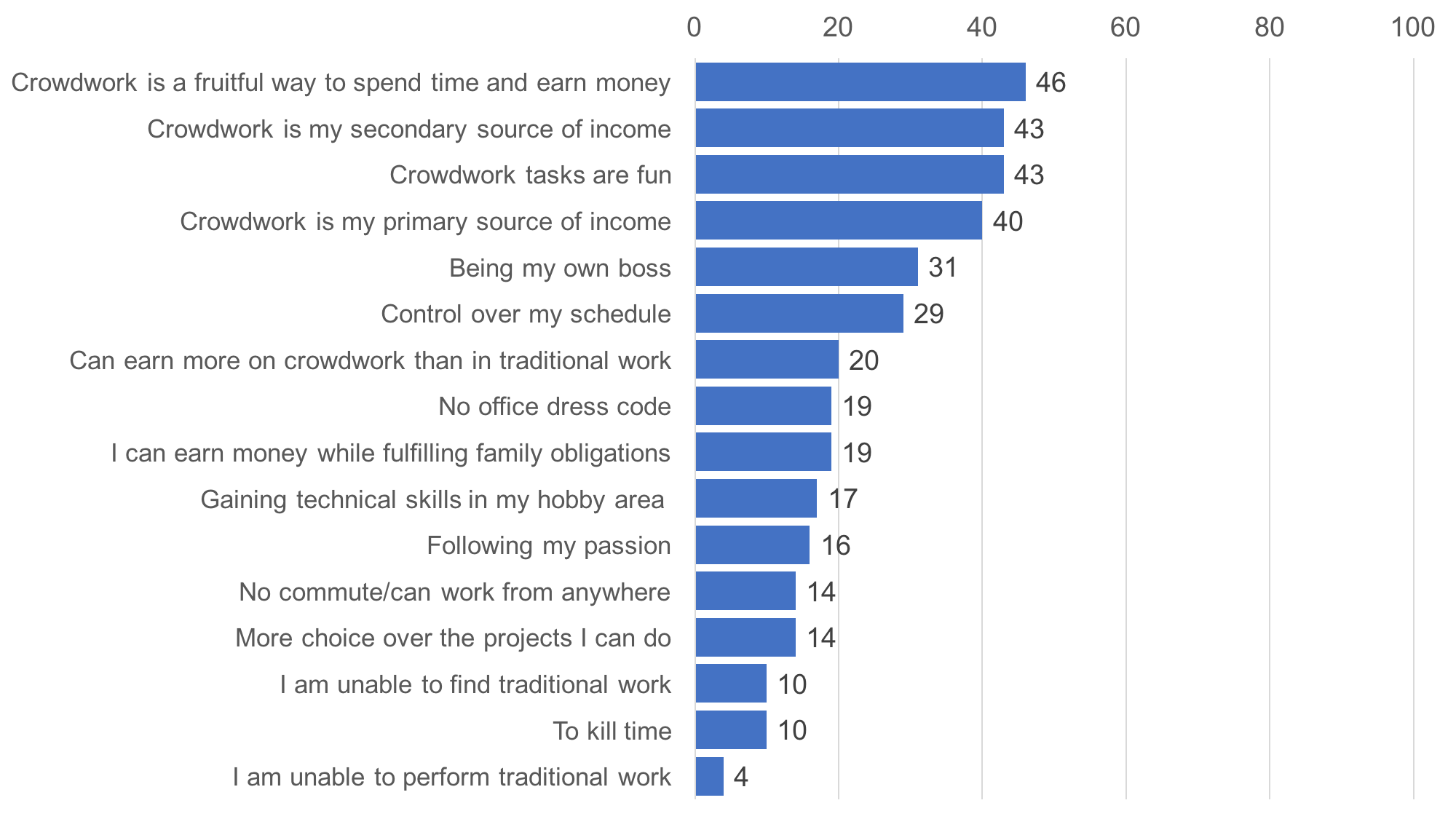
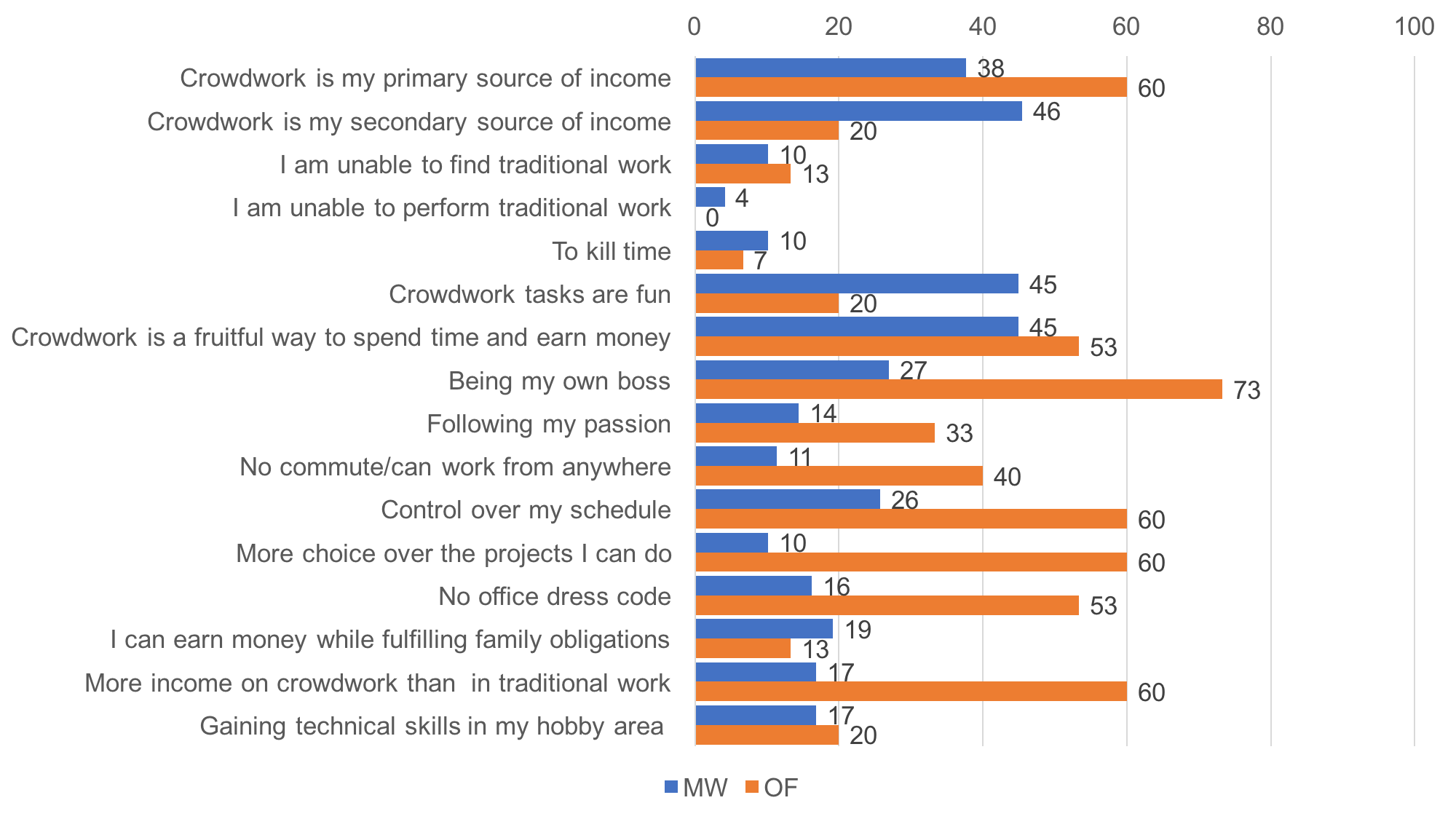

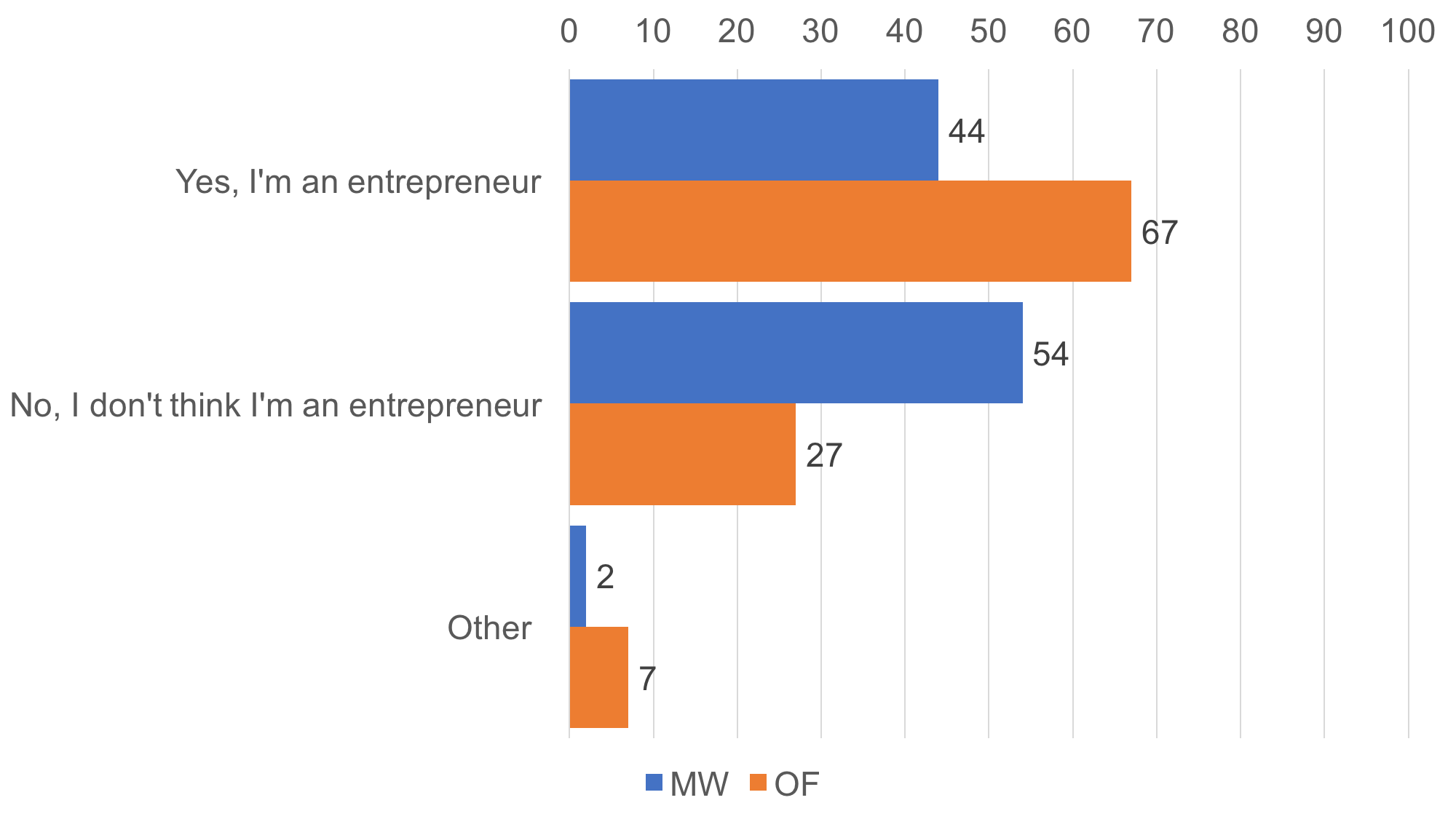 Figure 2. Reported entrepreneurial self-identity among microworkers, MW (n=167) and online freelancers, OF (n=15)
Figure 2. Reported entrepreneurial self-identity among microworkers, MW (n=167) and online freelancers, OF (n=15) 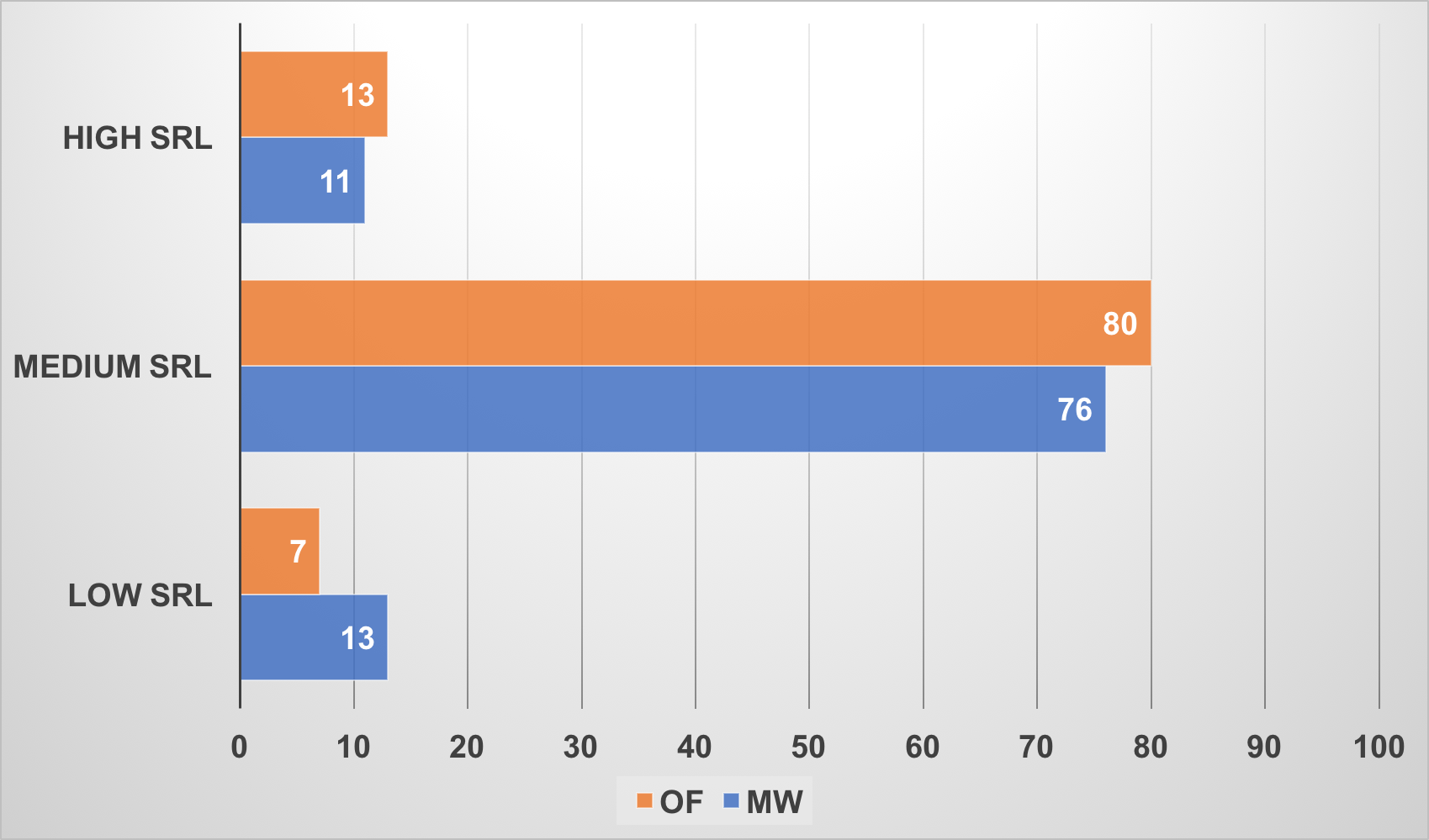 Figure 1. Distribution of SRL scores among the sample of crowdworkers, percentages (n=182, including microworkers (MW) n=167 and online freelancers (OF) n=15).
Figure 1. Distribution of SRL scores among the sample of crowdworkers, percentages (n=182, including microworkers (MW) n=167 and online freelancers (OF) n=15). 